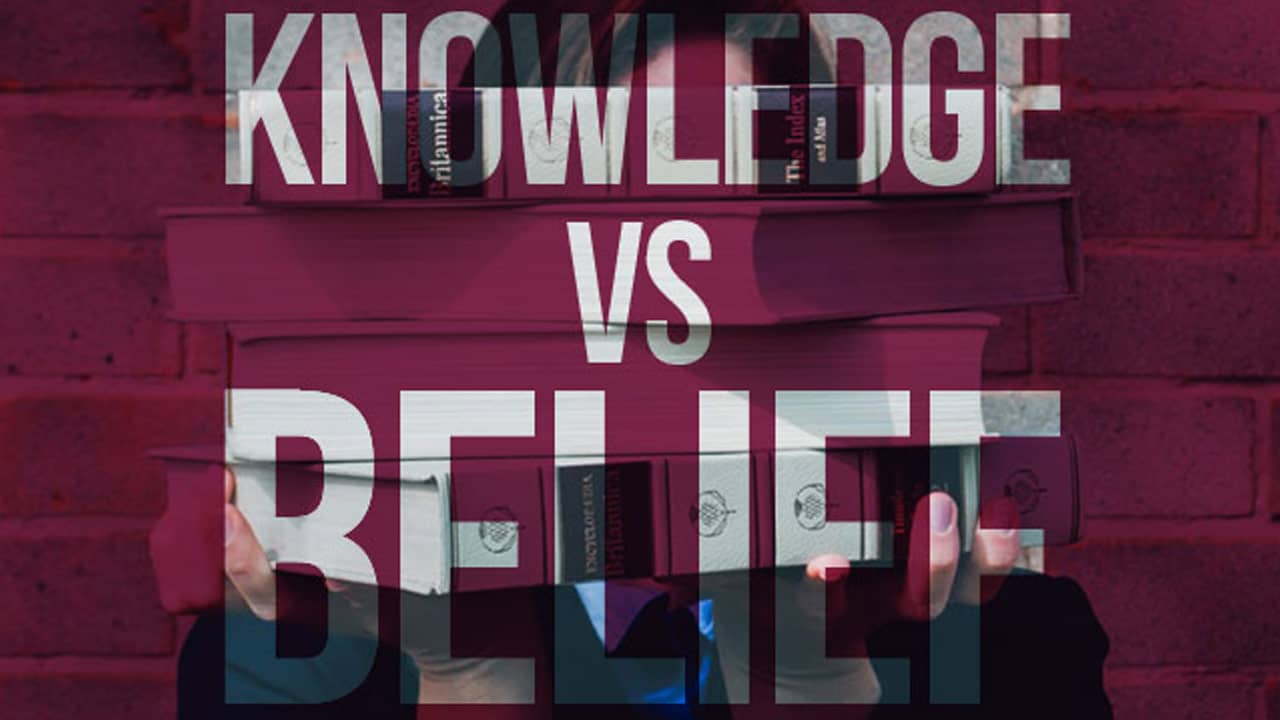Gist: Clarifying a very popular view about the topic Article 13 (from my latest book, A Controversial Clergyman) It is too widespread a confusion for me to leave it unchallenged. I am talking about the claim that belief is inferior to knowledge (without more, as lawyers would say). Michael Abrahams’ column in the Gleaner yesterday (July 9, 2018) betrayed this confusion and I had to deal with it in passing in a public forum at UTECH in 2001 involving Dr. Leahcim Semaj and Mutabaruka. Every statement purporting to be fact or true is a belief. Indeed, if you call to mind the basic moods in English language sentences, then if it is not a question (interrogative mood), a command (imperative mood), a wish (subjunctive mood), then it is in the indicative mood (an assertion, claiming something). Every such assertion or claim qualifies as a belief, but since some beliefs are quite… read more
Rev. Clinton Chisholm
The more popular claims of borrowing or influence between Christianity and the mysteries pertain to the birth/death/resurrection of Jesus Christ. What were the mystery religions? The mystery religions (contrary to George James’ book Stolen Legacy: Greek Philosophy is Stolen Egyptian Philosophy) were really Hellenistic religions, called ‘mystery’ because they involved secret ceremonies that were thought to bring their initiates some special benefits. They were more or less based on the annual vegetation cycle of life (spring) and death (fall). Each religion originated from different areas. From Mesopotamia—Tammuz or Dumuzi (the Sumerian version); from Egypt—the cult of Isis and Osiris (later called Serapis); from Greece—the cults of Demeter and Dionysus which later developed into the Eleusinian and Orphic mystery religions; from Phrygia in Asia Minor—the cult of Cybele and Attis; from Syria/Palestine—the cult of Adonis and from Persia (modern Iran)—the cult of Mithra (twin brother of the Zoroastrian god Ahura Mazda). Before responding… read more
Stimulus & Response Revisited – It seems that a few who read my letter to the editor about the Yellow Pages issue thought, like Mr. Robert Dalley, that I was dismissing the power of stimuli. On the contrary, I just wanted to focus on response because it is too often neglected perhaps because it broaches the awkward notion of responsibility for whom I am and for what I do. I had no clue then as a 17-year old boy about the practical difference between admiring and lusting I am too old to be unaware of the stimulating power of a good looking female body, even dressed normally, whether live, in a movie or in a photo. In fact I still recall the pangs of remorse I felt when, as a Christian for only a few months (in 1967) I lusted at a prostitute while on my way to a Convention at Jarrett Park in… read more
If you have a problem with the front cover of your copy of the current Jamaican yellow pages directory (dance hall scene) why not just flip it over to the back cover (ska/rocksteady scene) or better still just tear off the front cover. This is a simple solution to a simple problem in my view. The cover is almost literally a flat (two-dimensional) cardboard photo and that disturbs or turns on some of us? Give me a break. Now, though I am trained in music and philosophy and have been a Christian for 49 years I would not venture to do any kind of research at a live dance hall session because I personally could not “plead the blood of Jesus†fervently enough to keep all sections of my anatomy calm. Even then my possible response to the visual stimuli in that setting would be essentially saying much more about… read more
The Bible is probably the only ancient text that any Mike, Mary or Marcia waxes warm about despite stark ignorance of the book’s actual texts and historical contexts (plural). The lay critic may be very educated but (s)he and even most Christians need to understand how to read an ancient text from a different linguistic and cultural milieu than ours. I illustrate the need with the issue of slavery in the Bible, an issue I had to deal with in a Barbados newspaper years ago in response to a learned critic there. Said critic charged that “Slavery is justified in both principle and practice throughout the Old and New Testament.†Most of us learned in English literature class the basic point that a text must be read in light of its context. What contextual cues do we need to bear in mind to read the Bible responsibly? Well for starters we need to… read more
Scientific Problems for Atheists ‘Village atheists’ and the more educated ones need to read and properly digest the contents of Antony Flew’s last book. The late world renowned British Philosopher and ‘most notorious atheist’ Antony Flew in his last book gave details of the thinking that led him to abandon atheism. The book published in 2008 was titled There is a God. One of the three cardinal issues that made Flew abandon atheism was a critical event which he said could not at all be explained from a naturalistic or materialistic base but which made sense if you invoke God. Drawing on the work of fellow philosopher David Conway, Flew raises the first of three challenges to Darwinian naturalism. He says, “The first challenge is to produce a materialistic explanation for ‘the very first emergence of living matter from non-living matter. In being alive, living matter possesses a teleological [purpose-driven]… read more
The shocking death by suicide of comedic actor Robin William has catalyzed some thoughts I am still musing about, the unexpressed grief that some people go through. We all need to be more sensitive, discerning even, but even then we would miss some still. Can you wrap your brain around the level of grief Williams was experiencing that would prompt him to take his own life? Imagine the trauma of losing a pregnancy or several pregnancies through miscarriage when none of your friends even know that you are or were ever pregnant. Compound this, in a Church you are a single woman but become pregnant after ‘tiefing a likkle piece’ (=engaging in premarital sex) and suffer a similar fate. Who could you dare ask for prayer support let alone empathy? Silent grief. Then consider having been raped or seduced by someone whom you trust and respect and whose reputation would… read more
Any statement about causation or origin which uses the word chance is worthless, philosophically. The academic credentials or prestige of the person making such a statement is unimportant, the statement is still worthless. Take for example the basic belief held by most Astronomers and atheists prior to Vesto Slipher’s expanding universe discovery in 1913, “the Universe simply exploded into being, by chance, at the big bang and thus there’s no need for any God.†Or ponder the words of the Nobel scientist Jacques Monod in his book Chance and Necessity, “…chance alone is at the source of every innovation, of all creation in the biosphere. Pure chance, absolutely free but blind, at the very root of the stupendous edifice of evolution…†(page 112) Let me alert you to the fact that though we tend to use the word ‘chance’ loosely, chance is not a substance or entity that can… read more
A popular view among many people today is that all truth is relative; no truth is objective. By objective is meant true by means independent of the person asserting any truth-claim. For example, if someone says, “Fish is my favorite meat†that statement would be true relative to the experience of the speaker. In contrast, if someone should say, “All living things have encoded biological information in their DNA†that statement would not be relative to the speaker’s perception for it would be true regardless of who made the statement. Objective truth then, is truth beyond mere opinion. It is truth verifiable and undeniable as fact by rational beings other than the one making the claim. Strangely then, despite so much talk about living in an Age of Science & Technology that is remarkable, the belief is so common that ‘all truth is relative’. Indeed, this notion prevails not only… read more
What is it about a new year that prompts us to make resolutions? What grounds  justifies this annual pastime beyond empty traditionalism and wishful thinking? Just think about it, what really makes the last day of 2013 drastically different from the 1st day of 2014 to warrant resolutions? Try making sense of the difference between any two successive days beyond our conventional name change and day-related routines without mumbling “well, aahm, you see, I, I, my, my…†The future is uncertain and puzzling and each of us is largely unpredictable in terms of behavior. Desire is not the same as ability to perform so what’s the real value of new year’s resolution as opposed to any other day’s resolutions? One thing I would hope we all resolve to do for life is to think about issues more critically, that is to apply the basic principles of logic in any argument… read more
Is there any such thing as objective morality or is everyone free to just set and follow personal moral standards? If there is no objective morality why should habitual liars or anyone for that matter, be expected to speak the truth, always or even almost always? If the rightness or wrongness of acts, motives/attitudes depend on how individuals feel then morality is hopelessly subjective and everyone has a right to do as one pleases. Objective morality rescues us from this dilemma. But what is meant by objective morality? The ‘objective’ in objective morality simply means independent of any particular person’s feelings and value judgments on the moral issue in question. As Philosopher Paul Copan says “…morality is objective in that it isn’t a function of individual or cultural preferences, opinions, or responses. Morality is objective in that it is recognized and discovered rather than invented by humans.†(“True for you… read more
It may be rebutted but it cannot be refuted that no one can live and no academic discipline can operate without faith, properly defined! Faith, like its twin sister hope, is fragile but is a fundamentum in life, by that I mean it is absolutely foundational to life. So you ask me what then is faith in my book? As I have argued in lecture theatres and urged in sermons, faith is belief, based on but slightly in excess of evidence. Hope, if you must know, is confident assurance about the ‘not yet’. Those who are familiar with Hebrews 11.1 may be wondering about the nature of my definition. For those who lack familiarity with the Bible I’ll quote that text then explain the difference between it and my approach to faith. Heb. 11:1, from the New Revised Standard Version reads, “Now faith is the assurance of things hoped for,… read more
Ancient books are not always, if ever, easy to read properly, unless one can find helpful background information. The Herods in the New Testament are not clearly differentiated, so we read about King Herod in Mt. 2:1(re the nativity of Jesus) then there is a King Herod in Mk. 6:18 (the one whom John rebuked for marrying his brother’s wife) and there is yet another King Herod in Acts 12:1-2(who had James the brother of John killed). Same guy? No. The King Herod of the nativity accounts was King Herod the Great, that master-builder who was appointed puppet King of the Jews in 40 BC and who ruled as King of Judea from 37 BC until his death in 4 BC. When Herod the Great died in 4 BC the territories under his jurisdiction were divided among his sons. So [Herod] Archelaus (called ‘Herod the Ethnarch’ on his coins) ruled… read more
As we study the story surrounding Jesus’ death and resurrection, we may be led to believe things that are not supported by the Bible. Easter is the central feast in the Christian liturgical year. The Gospels speaks of Jesus’ resurrection from the dead on the third day after his crucifixion. Christians celebrate this resurrection on Easter Day or Easter Sunday (Resurrection Day or Resurrection Sunday), two days after Good Friday and three days after Maundy Thursday. Rev. Clinton Chisholm. clears up a few of the myths surrounding this much celebrated historical event. The words ‘crucifixion’ and ‘excruciating’ are derived from the Latin crux = cross. Crucifixion is primarily an extreme method of torture/punishment and is not necessarily synonymous with death. Death normally resulted from crucifixion, but in history there are cases where a crucified man survived on the cross for a few days. The nails in Jesus’ ‘hands’ were… read more
There is arguably no greater ‘beyond reasonable doubt’ evidence for the existence of a personal intelligent God than the presence and pervasiveness of biological information in all living things. Ponder the testimony of atheistic Biologist Richard Dawkins on the nature of biological information. “…at the molecular genetic level, every single one of more than a trillion cells in the body contains about a thousand times as much precisely-coded digital information as my entire computer…†(The Blind Watchmaker, 1986, xiii). What Dawkins is getting at here is the stubborn fact that DNA, the molecule of heredity, is information rich. “In order for any organism to be whatever it is, its genetic program (DNA) must specify what sort of organism it will be and, within surprisingly narrow limits, what specific characteristics it will assume…The DNA must be faithfully copied to every single cell of an organism that will eventually consist of billions… read more
Genuine and Bogus Blacks in The Bible: If you hear anyone saying that Christianity is a European religion, just lovingly, but firmly remind them of its place of origin in the Middle East (Jerusalem) and it is critical for Black Muslims and people in general to know that Islam was not the original faith of Africans. Christianity was introduced to Africa in all likelihood in the 1st century AD through the ‘Ethiopian Eunuch’ mentioned in Acts 8.27, an official in the Royal Court of what is now modern Sudan. Additionally, Christianity was accepted by The Royal Court of Ethiopia and became that country’s official religion from the 4th century AD, some 300 years before Islam even began in Arabia in the 7th century AD. It is incontestable that we have a genuine Black person in the early Church leader in Antioch referred to as ‘Simeon called Niger’ (Acts 13.1). In Simeon’s… read more
Black History Month: Awkward Reflections: Over the last five hundred years, Christianity in Africa and in most countries with people of African ancestry, has been charged with outright racism (when non-Blacks headed the hierarchy within denominations) and with inverse racism (when Blacks headed the hierarchy within denominations). To these charges the Church has had to plead ‘guilty’ or ‘guilty with explanation’, not, regrettably, by its own volition but in response to external pressure, not readily but reluctantly. The awful reality is that racism and inverse racism are still within sectors of the Christian Church and in societies where Christianity is the dominant religion, like the Caribbean region. To what extent this is true, is open to guesswork since, to the best of my knowledge, there has not been any definitive research done on the current levels of racism and especially inverse racism in any country within the Caribbean. There is… read more














You must be logged in to post a comment.